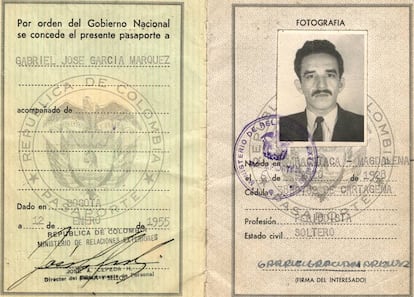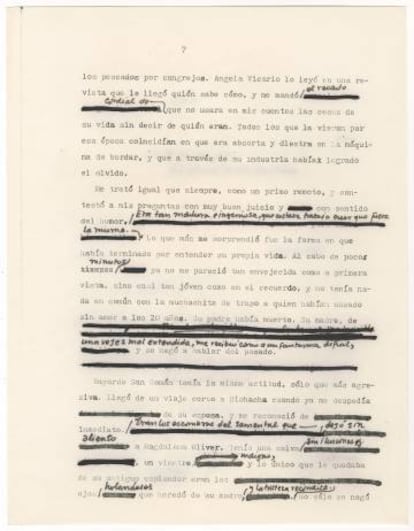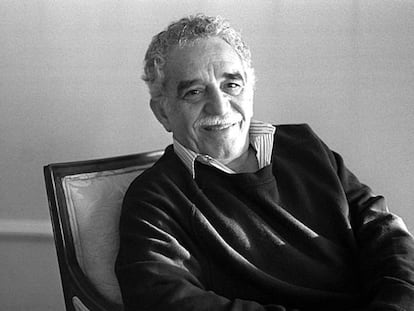When Gabriel Garc¨ªa M¨¢rquez wanted to be a foreign correspondent in Madrid
According to a letter discovered at the Harry Ransom Center in Texas, the author asked to work in the Spanish capital after fleeing Colombia in 1955


When the young journalist Gabriel Garc¨ªa M¨¢rquez was forced to leave Colombia in 1955 ¨C he had upset the government of dictator Rojas Pinilla with a series of articles linking smuggling to a boat accident that involved members of the?military ¨C he was forced to live in exile in Europe, wandering through cities such as Geneva, Rome and Paris, according to his biographer Dasso Sald¨ªvar.
It appears that Garc¨ªa M¨¢rquez could have established himself professionally in Madrid
?lvaro Santana Acu?a,? researcher at Whitman College
In 1955, a young Garc¨ªa M¨¢rquez also traveled to Madrid, which at the time was the capital of the Francisco Franco dictatorship, and asked El Espectador, a newspaper in the Colombian capital Bogot¨¢, if he could remain as a foreign correspondent.
¡°It was one of the ideas he proposed to his bosses in Colombia at that time. It¡¯s still a little unclear and needs to be studied more, but it appears that Garc¨ªa M¨¢rquez could have established himself professionally in Madrid,¡± explains ?lvaro Santana Acu?a, a researcher at the Whitman College in Washington.
Acu?a is referring to a letter written by the Colombian author in 1955, which has been conserved by the Harry Ransom Center of Humanities at the University of Texas, in Austin. Acu?a found the letter after studying the years-long correspondence between Garc¨ªa M¨¢rquez and Guillermo Cano, the editor of El Espectador, who was assassinated by Pablo Escobar¡¯s hitmen in 1986. ¡°Garc¨ªa M¨¢rquez was in Madrid and asked Cano for a column on Spanish issues, for example an article on [Spanish writer] P¨ªo Baroja,¡± says Acu?a.
The letters Garc¨ªa M¨¢rquez sent to Cano were acquired by the Harry Ransom Center at the end of 2018 in a bid to expand its already extensive archive on the author, who was born in Aracataca, Colombia in 1927, and died in Mexico four years ago in April 2014.
Garc¨ªa M¨¢rquez¡¯s personal files include 78 boxes of documents, 43 photo albums and 22 notebooks
The correspondence with Cano provides information about a little-known time in the writer¡¯s life, for instance his economic hardships in Paris and the feature articles he wrote while in Eastern Europe. ¡°He considered some of them, those on life in communist countries, to be his best work,¡± says Acu?a. The correspondence also includes a letter in which Garc¨ªa M¨¢rquez informs Cano that he is writing a novel called?Cien A?os de Soledad (or, One Hundred Years of Solitude). The letter includes a small excerpt from the book that was published in El Espectador in 1966. ¡°In the letter, he recognizes that it is the first time in his life that he¡¯s published a fragment of a novel that hasn¡¯t been published yet. He does this following the trend set by some of the greatest authors of the era, such as Carlos Fuentes or Mario Vargas Llosa.¡±
This decision to publish excerpts is fundamental to understanding how Garc¨ªa M¨¢rquez became a professional writer ¨C a subject that is the focus of a book Acu?a will publish next year, and which is based on his research at the Harry Ransom Center. Since 2014, the center¡¯s archive has included Garc¨ªa M¨¢rquez¡¯s personal files: 78 boxes of documents, 43 photo albums and 22 notebooks and notes, which have been partially digitized and are open to public consultation. These documents allow Acu?a to ¡°reconstruct the process in which Garc¨ªa M¨¢rquez passes from a talented Colombian writer to a Latin American and global author,¡± he says.
Garc¨ªa M¨¢rquez actively sought out the opinion of friends, colleagues and critics including Colombian poet ?lvaro Mutis, Spanish actress Mar¨ªa Luisa El¨ªo and her filmmaker husband Jomi Garc¨ªa Ascot, critic Emmanuel Carballo and writer Carlos Fuentes, to whom he sent the first 80 pages of Cien A?os de Soledad. From the first chapter published in El Espectador in May 1966 to the final edition released in 1967, ¡°42 significant changes¡± were made to the iconic novel.
Unpublished documents
The writer¡¯s eager search for feedback will also be explored at an exhibition called ¡°Gabriel Garc¨ªa M¨¢rquez, the creation of a global author,¡± which is directed and curated by Acu?a, and will open next year at the Harry Ransom Center in Austin, Texas. The exhibition will feature ¡°unpublished and little-known documents,¡± says Acu?a, who explains there will be a section on the author¡¯s life, another on the creation of Cien A?os de Soledad and its impact, an area focused on his political activism, and another on his other works like El amor en los tiempos del c¨®lera (or, Love in the Time of Cholera) and Cr¨®nica de una muerte anunciada (or, Chronicle of a Death Foretold).

Another part of the exhibition will look at his influence on writers across the world, including Toni Morrison and Haruki Murakami, and the authors who influenced him. ¡°In the Harry Ransom Center there are documents?that we will be able to show from, for example, James Joyce, Jorge Luis Borges and William Faulkner,¡± explains Acu?a.
The exhibition is set to open in the first week of February 2020, and will remain at the center in Austin until June. The organizers are already in talks with museums in Mexico about showing the exhibit there at the beginning of the summer.
English version by Asia London Palomba.
Tu suscripci¨®n se est¨¢ usando en otro dispositivo
?Quieres a?adir otro usuario a tu suscripci¨®n?
Si contin¨²as leyendo en este dispositivo, no se podr¨¢ leer en el otro.
FlechaTu suscripci¨®n se est¨¢ usando en otro dispositivo y solo puedes acceder a EL PA?S desde un dispositivo a la vez.
Si quieres compartir tu cuenta, cambia tu suscripci¨®n a la modalidad Premium, as¨ª podr¨¢s a?adir otro usuario. Cada uno acceder¨¢ con su propia cuenta de email, lo que os permitir¨¢ personalizar vuestra experiencia en EL PA?S.
En el caso de no saber qui¨¦n est¨¢ usando tu cuenta, te recomendamos cambiar tu contrase?a aqu¨ª.
Si decides continuar compartiendo tu cuenta, este mensaje se mostrar¨¢ en tu dispositivo y en el de la otra persona que est¨¢ usando tu cuenta de forma indefinida, afectando a tu experiencia de lectura. Puedes consultar aqu¨ª los t¨¦rminos y condiciones de la suscripci¨®n digital.










































